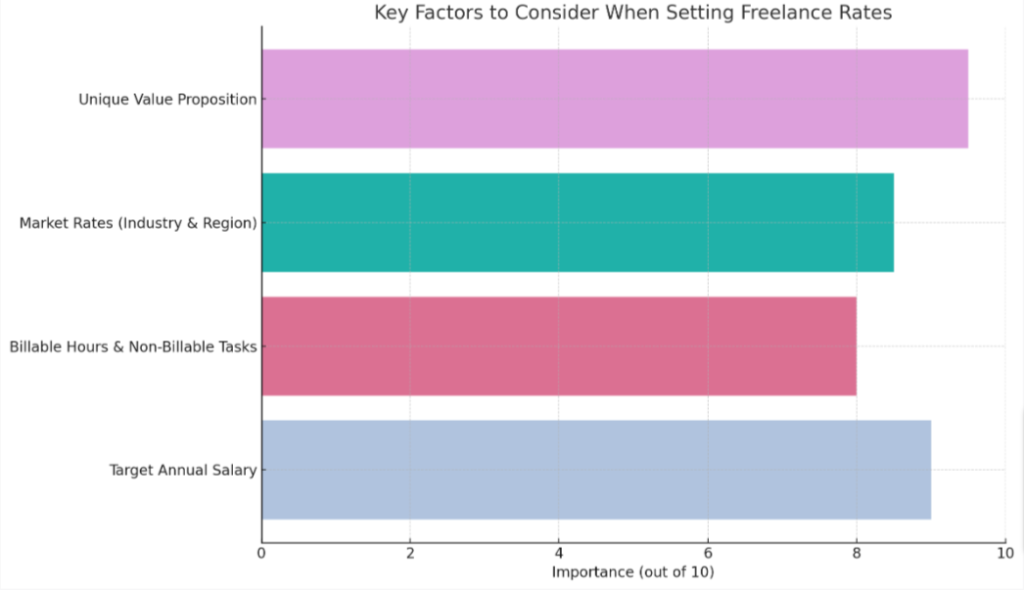Pricing Mastery: Determining Your Worth in the Freelance Market
Do you ever find yourself wondering how much to charge for your freelance work? The fact is, 58% of freelancers have trouble determining their rates. This article will help guide you through the process of setting effective prices that align with your skills and experience.
Ready to value your worth like never before? Dive in!
Key Takeaways
- Determine your target annual salary to establish a foundation for setting freelance rates.
- Consider factors like billable hours and non – billable tasks when calculating your freelance rate.
- Research market rates in your industry and region to stay competitive and fairly compensated.
- Price your services based on the unique value you bring, rather than solely relying on what others charge.
Factors to Consider When Setting Freelance Rates
When setting your freelance rates, there are several factors to consider such as your target annual salary, the number of billable hours, expenses, market rates, and the value of your services.
Target annual salary
Determining your target annual salary plays a vital role in setting freelance rates. Begin by identifying how much you aspire to earn in a year, keeping practicality in mind. This figure acts as the foundation of your pricing structure.
Realistically assessing personal financial needs and lifestyle preferences is necessary for this exercise. Also, factor in ongoing business expenses into this amount because it’s directly proportional to what you should charge clients for assignments or projects.
Number of billable hours
Determining your number of billable hours is crucial in setting freelance rates. It’s not just about the time spent on a task; other aspects such as client communication, invoicing, and personal development are part of the equation too.
For example, if you plan to work 40 hours per week but only 20 are billable, you need to consider this when calculating your rate.
The reality for freelancers is that non-billable tasks can often fill up the day. Tasks like marketing your services, updating your portfolio or hunting for new leads may not directly generate income but are essential for business growth.
Therefore, understanding how many working hours become truly billable each week becomes key in finding the right freelance rate.
Expenses
Tracking and calculating expenses forms a crucial aspect of setting freelance rates. Outgoings like office rentals, software subscriptions, travel costs or even coffee for late-night work sessions add up over time.
Documenting these outlays helps in framing an accurate picture of one’s financial needs and influences the freelancer’s final rate calculation. These expenses represent the overheads in freelance rates that need to be factored into your charge per project or hour.
By considering all cost factors, you ensure sustainable profits while maintaining competitive pricing for your freelance services. With this solid understanding of financial requirements, it becomes easier to determine what to charge based on the value provided while avoiding potential losses due to unaccounted costs.

Market rates
Market rates play an important role in determining your freelance rates. It’s crucial to understand the average prices charged by freelancers in your industry and region. Researching market rates will give you a baseline for setting your own prices, helping you stay competitive while also ensuring that you are fairly compensated for your services.
Keep in mind that market rates may vary depending on factors such as experience, niche expertise, and client demand. By staying informed about market trends and adjusting your rates accordingly, you can position yourself as a valuable professional in the industry.
Value of services
Understanding the value of your services is crucial when setting your freelance rates. Instead of solely basing your prices on market rates or competitors, it’s important to consider what makes your services unique and valuable.
Think about the expertise, skills, and experience you bring to the table that set you apart from others in your industry. By pricing based on the value you provide rather than simply trying to match what others charge, you can ensure that you are fairly compensated for the quality and results clients receive when working with you.
Additional Considerations When Setting Rates
When setting rates, freelancers should also take into account factors such as raising rates as they gain experience, calculating day rates for certain projects, and determining other rates like rush or overtime charges.
Raising rates
Raising rates is an important consideration for freelancers. As you gain more experience and expertise in your field, it’s only fair to increase your rates to reflect the value you provide.
Raising rates allows you to earn a higher income and attract clients who understand and appreciate your skills. However, it’s essential to approach rate increases strategically and communicate them effectively with existing clients.
By regularly evaluating and adjusting your rates, you can ensure that you are fairly compensated for the quality of work you deliver.
Calculating day rates
Calculating day rates is an important part of setting your freelance rates. Here are some factors to consider:
- Determine your desired annual salary
- Divide that by the number of working days in a year to get your daily income goal
- Consider the number of billable hours you can work in a day
- Calculate your hourly rate by dividing your daily income goal by the number of billable hours
- Adjust for non – billable time, such as administrative tasks or marketing efforts
- Take into account any additional expenses or overhead costs that need to be covered
Other rates (rush, overtime, etc.)
When working as a freelancer, it’s important to consider other rates in addition to your standard freelance rate. These rates may apply in specific situations and can help you accurately reflect the value of your work. Here are some examples of other rates to consider:
- Rush rates: If a client requires a project to be completed within a shorter timeframe, you may charge a higher rate for the expedited service.
- Overtime rates: If you need to work beyond your regular hours or during weekends/holidays, it’s appropriate to charge an increased rate for the additional time spent.
- Revision rates: Sometimes clients may request revisions or changes after the initial delivery of a project. In such cases, you can set a separate rate for revisions to ensure that you are compensated for the extra work involved.
- Travel rates: If your work requires traveling to meet with clients or attend events, it’s common to charge additional fees to cover travel expenses and time spent away from your usual workspace.
- Retainer rates: For long-term projects or ongoing support, you may negotiate a retainer fee with the client. This allows them access to your services on an ongoing basis at a predetermined rate.
- Package rates: Instead of charging per hour or per project, you can offer package deals that include multiple services or deliverables at a discounted rate.
Managing Profits and Irregular Work
To ensure financial stability, freelancers should account for taxes and utilize contracts and payment terms when managing profits and dealing with irregular work.
Accounting for taxes
Accounting for taxes is a crucial aspect of managing profits and irregular work as a freelancer. It is important to factor in the amount of taxes you will owe when determining your freelance rates.
By understanding and planning for your tax obligations, you can ensure that you are setting prices that will allow you to cover these expenses and still achieve your desired annual salary.
This requires tracking your income, keeping records of deductible expenses, and consulting with a tax professional to determine the appropriate amount to set aside for taxes. Taking these steps will help you maintain financial stability while operating as a freelancer.
Utilizing contracts and payment terms
Contracts and payment terms are essential tools for freelancers to ensure a smooth and fair working relationship with clients. They provide clarity on expectations, protect your rights, and outline the terms of payment. Here are some important considerations when utilizing contracts and payment terms:
- Clearly define the scope of work: A well-written contract should outline the specific services you will provide, including deliverables, deadlines, and any revisions or additional work that may incur extra charges.
- Set payment terms: Specify when and how you expect to be paid. This could include payment milestones based on project progress or a schedule for regular invoicing. Be clear about any late fees or interest charges for overdue payments.
- Establish cancellation policies: Include provisions for what happens if either party needs to terminate the contract early. This can help protect your income in case of unexpected cancellations.
- Protect intellectual property rights: Specify who retains ownership of the work and whether clients have the right to use it exclusively or non-exclusively. Consider copyright laws and licensing agreements.
- Outline dispute resolution procedures: In case conflicts arise, establish a process for resolving disputes such as mediation or arbitration before pursuing legal action.
- Seek legal advice if necessary: Depending on the complexity of your freelancing business, it may be wise to consult with a lawyer to review your contracts and ensure they comply with local laws.

Conclusion and Next Steps
Determining the right freelance rates can be a complex process, but it’s crucial to consider factors like your desired salary, expenses, and market rates. By understanding your worth as a freelancer and setting rates that reflect your expertise, you’ll ensure fair pricing for your services.
Additionally, regularly evaluating and adjusting your rates over time will help you stay competitive in the industry. Now that you have a better understanding of how to set your rates effectively, take the next step by implementing these strategies into your freelance business.

